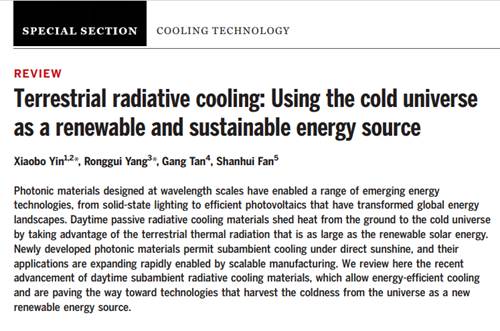On November 13rd, an article of Ronggui Yang, professor of School of Energy and Power Engineering, was published in Science, one of the most influential science journals. The survey, titled as Terrestrial radiative cooling: Using the cold universe as a renewable and sustainable energy source, was co-written by three scientists: Xiaobo Yin, professor at University of Colorado Boulder, Gang Tan, professor at University of Wyoming and Shanhui Fan, professor at Stanford University.

The essay reviews the recent advancement of daytime passive radiative cooling materials, which shed heat from the ground to the cold universe by adopting the terrestrial radiation. According to the paper, applying the material to building surfaces under direct sunshine could reduce surface temperature by over 20℃, and internal temperature by 10℃. Terrestrial passive radiative cooling harvests the coldness of the universe by exploiting the balance of radiative heat flow. The technology enables the temperature of a sky-facing object to fall below the ambient air temperature by minimizing its heat gain while maximizing the outgoing thermal radiation through the atmospheric window, i.e., 8 to 13 μm at no additional energy cost.
The energy-free technology, first used in photonic crystal structures, is seeing wider application as more materials of radiative cooling are discovered. The survey paves the way toward technologies that harvest the coldness from the universe as a new renewable energy source and predicts future applications of the radiative cooling technology.
The review paper came after the invitation of Science to review the research progress of various radiative cooling metamaterials in recent years. Back in 2017, a paper in which Dr. Yang and his team introduced their achievements in radiative cooling metamaterial was reported by Science, and was latter chosen to be included in the Top Ten Breakthroughs of 2017by Physics World and Top Ten Global News by the Economist.
Dr. Yang is serving as professor of School of Energy and Power Engineering. Prior to that, he received his Ph.D. degree focusing on Nanoscale Heat Transfer from MIT in February 2006, starting his career as an assistant professor at CU-Boulder. He was later promoted to Full Professor in 2016. Dr. Yang has made great contributions in heat transfer area, which has won him numerous awards including the Nukiyama Memorial Award in 2020.
Written by: Jingyi Ye
Edited by: Scott, Yumeng Peng
Source: School of Energy and Power Engineering
Link to the paper:https://science.sciencemag.org/content/370/6518/786.abstract
